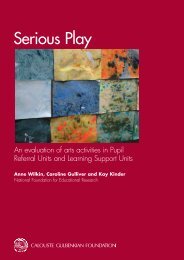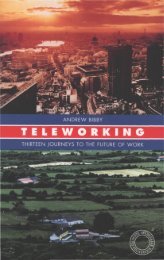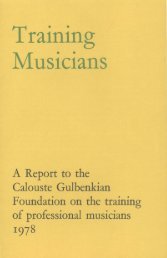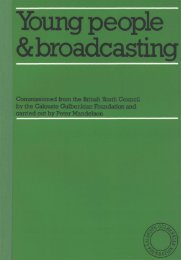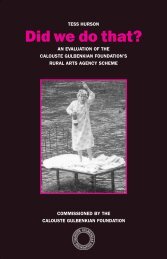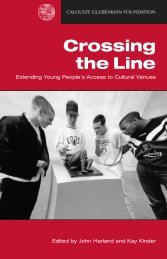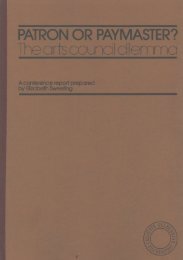Why Restorative Justice? - Calouste Gulbenkian Foundation
Why Restorative Justice? - Calouste Gulbenkian Foundation
Why Restorative Justice? - Calouste Gulbenkian Foundation
Create successful ePaper yourself
Turn your PDF publications into a flip-book with our unique Google optimized e-Paper software.
THE OFFENDER<br />
was not ready to stop crime altogether. It was the only way of life<br />
he knew. Many of his friends are deeply into crime themselves.<br />
He has no job, nor skills, nor other support system.<br />
Robert’s story<br />
Robert was 15 when he set fire to his school one night, causing<br />
£26,000 worth of damage and putting the school library out of action<br />
for several weeks. He had told his parents he was staying with a<br />
friend, so he walked through the night and returned home in the<br />
morning. He remained undetected until he walked into the local police<br />
station six days later to ‘get something off his chest’. At first the police<br />
did not believe him, as he had not come to their attention before in<br />
any way.<br />
When asked why he had set fire to the library, he said he had<br />
been worried about his forthcoming exams, and he thought that disrupting<br />
the library (where the exams took place) might buy him more<br />
time to revise. He had given himself up as he began to realise the<br />
harm he had caused and was consumed with guilt and remorse.<br />
He was excluded from school while he waited for the Crown<br />
Court case, where (some months later) he was sentenced to two years<br />
at a Young Offender Institution. There he struggled to survive, being<br />
ridiculed and bullied for giving himself up to the police. Robert’s parents<br />
felt he needed help, not incarceration. Robert himself wanted the<br />
chance to explain to the school why he had acted as he did.<br />
A local youth restorative justice project contacted the head<br />
teacher of the school to see if he was interested in meeting with Robert<br />
and his family. He was keen to do so, as he had many questions to<br />
ask, and wanted to talk to Robert himself. The head teacher also<br />
wanted Robert to know that the school had not wanted him to go to<br />
prison and had written a letter of reference for him at court.<br />
Robert’s parents were also struggling to come to terms with what<br />
had happened. They wondered what the school thought of them as<br />
parents, and wanted the chance to express their support of the school.<br />
After numerous visits and discussions, a Family Group Conference<br />
was convened at the school. Robert was given special leave from<br />
the prison to attend, and his parents and one of Robert’s friends were<br />
there. The school was represented by the head teacher.<br />
The conference lasted over two hours. Robert talked about what<br />
he had done, and his parents listened. Then they too had a chance to<br />
36









